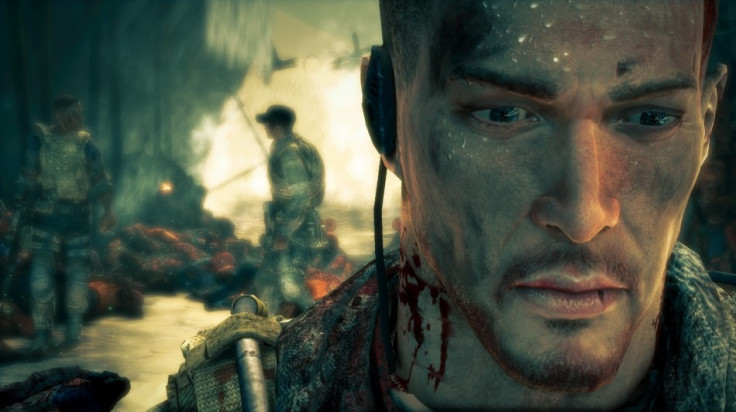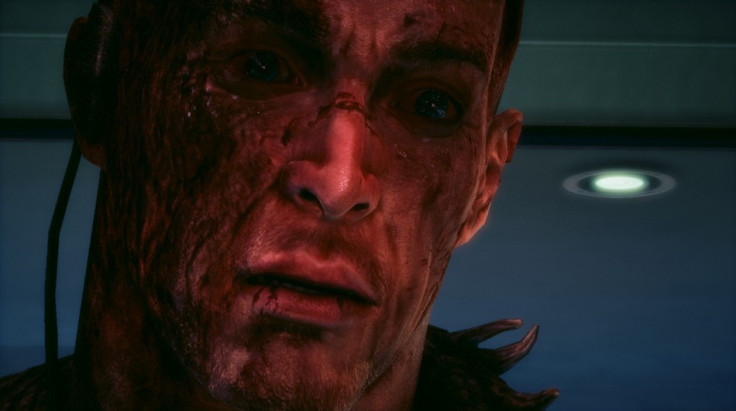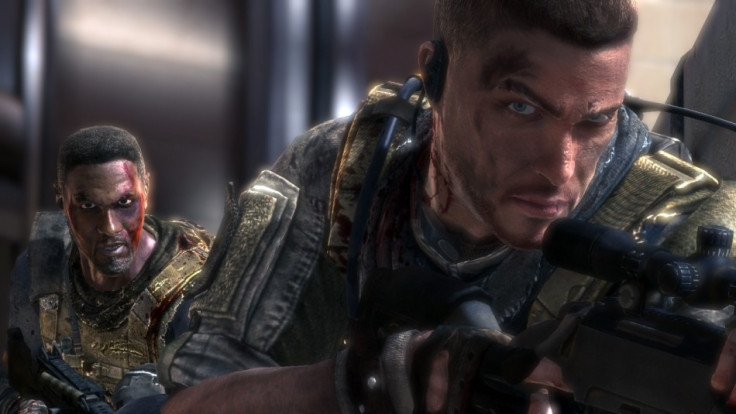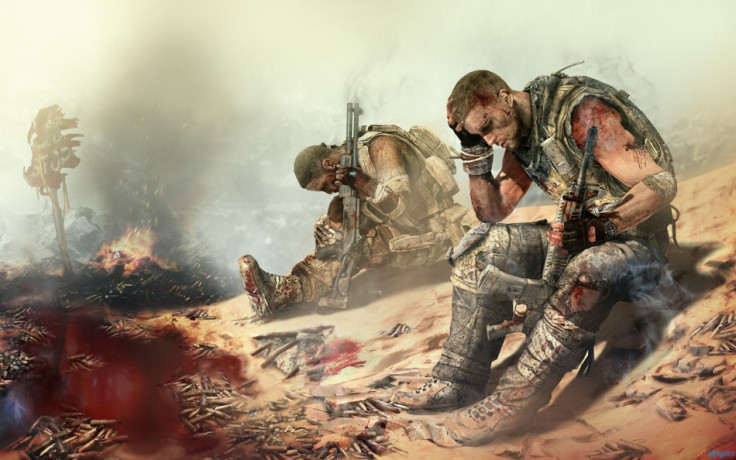Killing Equals Winning - Spec Ops: The Line and Killing is Harmless
It's time for games to put down the guns...

For computer game players, killing has always meant winning. From the early days of shooting down flying saucers in Space Invaders, to the hyper-real Modern Warfare of today, videogames have consistently translated fighting and violence into victory.
It's a relationship best reflected in war-shooters like Call of Duty and Battlefield, where you endlessly shoot, stab and explode bad guys in a bid to save the world. Titles like these exemplify games' unquestioning attitude to violence, by taking real-world conflicts, like Iraq and Afghanistan, and using them as shorthand for fun and excitement. Without any regard for moral implications, war-shooters expect you to just keep killing.
It's a climate of acceptance that's also present in game criticism. Content with discussing games in technological and mechanical terms, journalists have yet to form a discourse for talking about games as art. Despite the renaissance heralded by better consoles and more money, the conversation around computer games remains incredibly basic; like the war-shooters of today, it isn't getting to the heart of the issue.
Heart of Darkness
Walt Williams and Brendan Keogh are working to change these things. The writer of Spec Ops: The Line, Williams wants to bring down the AAA war game from within, using gameplay and narrative to deconstruct the idea that killing is winning; Keogh, a freelance critic for Edge magazine, is the author of Killing Is Harmless, a book that explores how Spec Ops does that:
"There are a lot of problems in military shooters," explains Keogh "and Spec Ops exposes those. That level of criticism in computer games helps people better understand why these things are meaningful to so many people, and to help videogames have their place in culture better recognised."
Developed by German studio Yager, and released in June 2012, Spec Ops: The Line follows a three-man Delta Force squad sent to recover a rogue Army colonel from Dubai, after it's been destroyed by a sandstorm. There are hints of Joseph Conrad's Heart of Darkness, and Francis Ford-Coppola's Apocalypse Now!, but The Line remains something unique to gaming, an interactive story fuelled by player interaction:
"At the beginning of the game especially, the idea was to keep things very conventional to make players feel as if this was a world familiar to them," explains Williams. "We were able to play a lot with people's built-in expectations and use them against the player to get their guard down, until that point later in the game where we pull the rug out and the narrative completely changes."
Spec Ops: The Line constantly confronts you with the consequences of your killing. A great, early example comes when you gun down what looks like a firing squad only to discover they were in fact soldiers trying to lead refugees out of Dubai:
"I think you have to be a shooter to be critical of shooters," continues Williams. "Your actions have to be critical of shooters. We want the character to feel like he's degrading with every kill.
"You buy a shooter to shoot things," he continues "and the story just tells you who you're shooting and why. Military shooters tend to rest on the idea that you're a hero; they're the bad guys and shooting them until they're all dead means you win. Gun violence in games - and in real life - is an easy, lazy form of conflict resolution. And it creates more problems. But in games we whitewash it because it's easy to design and it's easy to dramatise.
"We wanted to show the dirty truth of it. We wanted the moral choices in Spec Ops to reflect back on the core mechanics."
Violent satire
The Line is a biting, but also well disguised commentary on video game violence. It feels plain, like a generic shooter cut from the same cloth as Gears of War, Uncharted or Army of Two, and you're encouraged to play it like you would any other third-person game with guns in: You hide in cover, pop out to shoot bad guys then move on when they're all dead.
But as the game progresses, it increasingly rubs your nose in the consequences of what you've done. Killing your way through the game us usual, you end up shooting unarmed civilians, executing hostages and destroying Dubai's water supply. The Line's most powerful moment comes when, believing them to be a platoon of enemies, you drop white phosphorus bombs onto forty refugees.
Spec Ops' familiar gameplay lures you into the false sense that, as normal, killing equals winning; Keogh's book, a first-person account of his experience playing the game, explores how the player's actions create a satire of war-shooters:
"It wasn't like I played the game and thought 'I need to write a long form book about this'," explains Keogh. "It was more that I couldn't think of any other way to cover it. I just started writing and realised a few thousand words in that I was basically writing my way through the entire game from start to finish.
"I'm trying to bring videogames into academia, and trying to get cultural studies on board with that rich textual analysis of specific videogames. A lot of the academic work I've found on videogames has been frustrating because it has this pervasive tone that it's all about helping developers to understand how to make better games... I think it's productive to think about how you're doing things, just as much as how the game is making you do things."
Critical analysis
The Line invites Keogh's level of critical analysis. Its literary ambitions are evident, not just in the broad themes that overarch it, but also in your character, Captain Walker, who has a legitimate arc from the beginning to the end of the game. At the start, he's a professional, clean US solider; by the end, he's a bellowing, bloodied wreck, with burns on his face and his uniform in tatters.

Like Dubai itself, Walker's overall state deteriorates the more he kills. He's another example of how The Line represents killing in videogames:
"We wanted to take away from that power fantasy," explains Walt Williams. "With Dubai as the setting, and with the sandstorm, that really let us build the themes we were going for, of all these layers being peeled away."
For Keogh, that level of novelistic writing marks a stride forward for computer games:
"Historically games have been worked on by engineering students and technology students, but that's opening up as it gets easier to make them and we're seeing a more diverse background of people coming in who don't need that programming background.
"It's really only been in the past few years that that significance of having a full-time writer has appeared in a lot of game development. It used to be that a writer would come in and just write a story and the development team would jam levels into it. Today, writers and narrative designers tend to be there from start to finish and have a hand in everything, like level design and character design.
"Games need to be collaborative in a way that somehow still allows for that strong voice to come through," continues Keogh. "That's something that really makes Spec Ops special, where different bits of the game don't feel like they're screaming different things at you. It feels like there's one unified idea propelling the game."
Evolve and mature
Computer games have reached a point where they need to think about violence. The clear-cut, black and white morality of the WW2 shooters of the nineties has given way to the grey ethics of the War on Terror, and the ultra-realistic visual design of seventh generation consoles. Games look and feel more like real-life than ever, and when they brush up against serious issues like America and the Middle East, as they often do, they have a responsibility to keep a level head.
Killing is Harmless is Brendan Keogh's way of opening up a discourse. By scrutinising Spec Ops: The Line's treatise on violence, it expands the scope of what videogames can do:
"I think it enriches the culture around videogames to have a strong form of criticism happening. There are a lot of critics and bloggers trying to get it off the ground but games still don't really have that level of debate. Killing is Harmless is one of several projects that are happening to strengthen videogame criticism.
"I've made more sales than I ever expected; I wrote it primarily because I wanted to write it, as a proof of concept that people want to read long things about videogames...The readership is growing that wants to see that critical stuff and it's certainly spreading into more mainstream magazines.
"We're still trying to develop a critical vocabulary," continues Keogh. "It's not one of those things that you can sit down and make...as we keep writing it will evolve and mature, and we'll have these words."

And as that new kind of criticism is inspired by games like Spec Ops, Walt Williams believes it will in turn encourage developers to think more about their games:
"As more books like these come out, you're going to find creators looking to do more with their games," he explains. "Not simply just making games that are meant to be entertaining and "cool", but games that have things to say; that speak to the medium and speak to the player.
"You already have things like literary criticism and film criticism that go into so much detail of exploring the layers of those types of art - why not ours?"
Embracing contradictions
Like Captain Walker, it feels like the more computer games continue down a single path, the more damage they're going to do to themselves. We need games like Spec Ops: The Line, and books like Killing is Harmless, to make us stop, look and think about where this medium is headed.

It used to be that killing was just fine - games were cartoonish things that were purely for fun. Writing about games as if they were just for fun was fine, too, since for the most part, especially in the early nineties Nintendo era, they were.
But that's changed. The people making, writing about and playing games have grown-up. The entire culture has reached a point where, if it wants to be taken seriously, it needs to start dealing properly with itself and with real-world issues. The work of Brendan Keogh on Killing is Harmless, and Walt Williams on Spec Ops: The Line shows that games are ready to move on:
"Right now we have this really reductive way of criticism where we split visual and audio design and mechanics," concludes Keogh "and that's a silly distinction to make. We consume videogames as a single piece of art; we don't consume visuals over here and mechanics over here. It's just all at once.
"There's a quote I put at the start of Killing is Harmless from Dear Esther, which talks about taking everything all at once; embracing contradictions in everything. And that's how I think we have to talk about videogames."
By embracing the recurring contradiction of killing equalling fun in videogames, Spec Ops: The Line offers a stark portrait of the state of the medium; by critiquing that portrait in such intricate detail, Killing is Harmless explores what games can do to become better:
"There's nothing wrong with things just being dumb and entertaining," concludes Williams "but I think the medium's ready to move away from that and offer more types of AAA games."
Killing is Harmless is available to download now from Stolen Projects
© Copyright IBTimes 2025. All rights reserved.






















